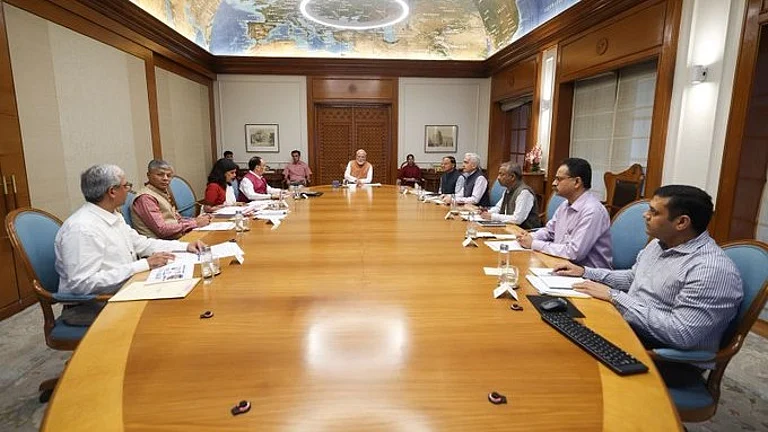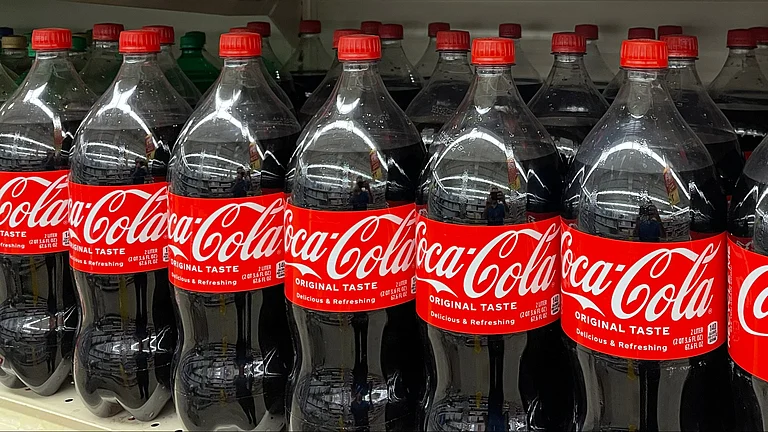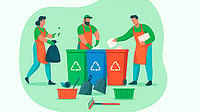The contradiction is evident: plastic pollution is pervasive, endemic and easy to visualise, choking rivers with waste and littering oceans. Yet when it comes to tracing and tracking producers of plastic packaging, there is little visibility on its journey from production to disposal.
But come July 1, plastic bags and multi-layered plastic packaging must mandatorily carry a bar or QR code that would include details of the material, its thickness, the name of the manufacturer and their contact information. The regulation also applies to importers and brand owners of a product.
The idea is simple: improving the traceability of plastic packaging in products and making producers accountable for the life cycle of the material. Penalties for non-compliance include up to five years in prison or fines up to ₹1 lakh.
Tracking Trash
The build-up to tracking and tracing plastic packaging has been some time in the making. The Ministry of Environment, Forest and Climate Change has streamlined the Plastic Waste Management Rules, 2016 over the years to curb rising plastic pollution. Since April 2025, beverage makers are mandated to use 30% recycled plastics in rigid packaging, such as polyethylene terephthalate (PET) bottles. The plan is to reach 60% by financial year 2029.
Experts point out that the barcode system, under the Extended Producer Responsibility (EPR) regulations, marks a shift in government strategy to make producers responsible for funding recycling of plastics used in packaging. So far, local governments and municipalities have been paying for end-of-life costs of using plastics, largely funded by taxpayers.
“The EPR regulations can create much-needed transparency and accountability to ensure that the cost of managing plastic waste, which is significantly higher than other waste types, is borne by those who produce it,” says Siddharth Ghanshyam Singh, programme manager, Centre for Science and Environment, a think tank.
In several states in the US and the European Union (EU), where EPR laws are well developed, producers need to pay a fee to fund collection, sorting and processing of packaging material. As a result, brands incentivise consumers to return packaging and used bottles. These packaging materials are then recycled or destroyed depending on their end-of-life status.
In India, bringing producers, importers and brand owners to account for plastic used in product packaging is much more complex given the informal nature of waste collection, segregation and processing ecosystem. The informal sector, estimated to handle around 60% of India’s waste, needs training and additional resources to scan and segregate barcoded plastics. Businesses, too, need to figure out how to inculcate circularity within their value chain.
Accountability Matters
Traceability and accountability for plastic use put a real cost on the use of plastic. Experts suggest that to cut down on their dependence on plastics, businesses need to shift to rigid packaging formats or embrace reuse and refill systems. However, these solutions have costs and liability implications.
According to Hisham Mundol, chief adviser, India, to Environmental Defence Fund, a non-profit, India’s new EPR regulations for traceability are a necessary step, signalling a shift from voluntary action to enforceable responsibility.
“But regulation alone won’t be enough—we must prepare Indian businesses not just to comply, but to lead,” he says. For that, the plastic-waste challenge before industry needs to be reframed as an opportunity. “A low-plastic world will create new markets, drive entrepreneurship and open export possibilities for Indian solutions,” he adds.
“Compliance with EPR norms, traceable recycling mechanisms and usage of eco-friendly packaging materials are fast becoming prerequisites for international trade,” says Ajit Gupta, managing director, Ajit Industries, a leading manufacturer of industrial tapes.
Industry players say businesses should focus on expanding collection and segregation mechanisms, investing in certified recycling technologies and adopting digital tracking systems to fulfil their EPR obligations. “Public-private partnerships can further accelerate capacity building in underserved regions,” suggests Jeevaraj Pillai, director, sustainability and president, flexible packaging and new product development at Uflex, a major packaging company.
These changes not only hold manufacturers accountable for the plastic they generate but also offer Indian businesses a rare opportunity “to align environmental stewardship with economic competitiveness”, as Gupta puts it.
Businesses, Brace Up
Experts and industry players point out that large and organised players, particularly those in the fast-moving consumer goods (FMCG), pharma and industrial packaging sectors, are better prepared to comply with EPR norms. “Many of them have already mapped their plastic footprints, on-boarded producer responsibility organisations and invested in recyclable or reusable packaging formats,” says Gupta. Several global players operating in India have brought best practices from overseas, creating a positive impact across the value chain.
Take for instance, ProcMart, a business-to-business supply chain and procurement platform. According to Sachin Jain, its chief financial and strategy officer, the firm is investing in digital tools that allow end-to-end traceability of packaging materials, partnering only with vendors who meet compliance standards and incorporating sustainable alternatives wherever possible.
Industry players point out that the mandate to step up the use of recycled plastics in rigid packaging material has triggered investments worth around ₹10,000 crore in advanced recycling infrastructure over the last three years. “These investments have significantly enhanced the country's capacity to process plastic waste, with a particular focus on food-grade recycled PET [rPET],” says Pillai.
According to industry estimates, India currently has 124 kilotonnes (KT) of operational food-grade-certified rPET capacity. The projected capacity is likely to touch 715 KT by end of 2026. This growing capacity is well-aligned with projected demand under the EPR framework, says Pillai.
The rPET segment has attracted most of the fresh investments in recent years, while the overall ecosystem for plastic recycling and waste management remains largely dominated by small, medium and informal players.
To unlock the business potential in the plastic-waste sector, the opportunity lies not just in compliance, but in creating value across the plastic lifecycle. “We need to put a real cost on plastic—not just in the form of penalties for pollution, but through market-based instruments that fund clean-up and incentivise alternatives. We need to channel financing into innovation: biodegradable materials, circular packaging models and new supply chains,” says Mundol.
Falling in Line
Experts report a gradual change in mindset in corporate India, particularly among large consumer-facing companies, over the last 4–5 years. Brands are rethinking packaging design, exploring sustainable alternatives while making downstream investments in material recovery facilities (MRFs) and collection systems.
“The narrative is moving from reactive waste management to proactive circularity planning. However, this transition is still in its early stages,” says Ipsita Roy, senior manager at AA Garg and Company, an environment-management consultancy.
But even as some FMCG companies are bucking the trend, there remain significant gaps in establishing a formalised, traceable and accountable ecosystem that embeds industry best practices, points out Roy.
As India prepares for additional circularity mandates—especially the reuse and use of recycled content in packaging (UReP)—the need for ecosystem-wide transformation is widely felt. “These obligations require greater investment in recycling infrastructure, R&D, packaging innovation and supply-chain alignment to support closed-loop systems,” says Roy.
Some organisations have started to move in this direction. The single-use-plastics-free certifications programme, for instance, is gaining traction among businesses through training and sensitisation, say experts.
Then there is the India Plastics Pact, a voluntary business initiative launched in 2021 by the Confederation of Indian Industry, which provides a platform for the packaging ecosystem to collaboratively work towards a common set of targets to be achieved by 2030.
The targets are ambitious, ranging from ensuring that 100% of plastic packaging is reusable, recyclable and compostable to securing 25% of average recycled content across all plastic packaging.
Currently, 54 Indian organisations are signatories to the pact. Industry players concede that most businesses have been cautious in committing themselves to these targets, however, some individual companies may meet these targets. But as far as India Inc is concerned, for the time being, these remain aspirational goals.



































